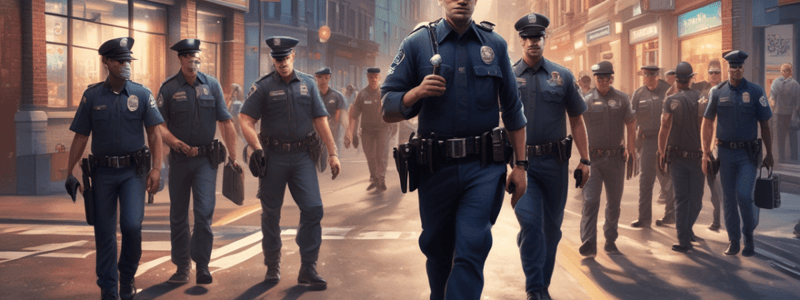Podcast
Questions and Answers
What does an officer need to consider before initiating a pursuit?
What does an officer need to consider before initiating a pursuit?
- The distance to the fleeing person
- The weather conditions
- The availability of backup
- The seriousness of the offense (correct)
How should officers determine relative danger during a pursuit?
How should officers determine relative danger during a pursuit?
- By assessing the speed of the fleeing person
- By using supposition and intuition
- By decreasing their speed to evaluate the situation
- By relying on facts available to them (correct)
What is one thing officers are NOT allowed to do when engaging in a pursuit?
What is one thing officers are NOT allowed to do when engaging in a pursuit?
- Rely on supposition or intuition
- Use lights and siren
- Drive with due regard for safety
- Assume the fleeing person's danger to the community (correct)
What is an officer's duty regarding fellow officers and the public during a pursuit?
What is an officer's duty regarding fellow officers and the public during a pursuit?
How should officers continue to evaluate their judgment during a pursuit?
How should officers continue to evaluate their judgment during a pursuit?
Why is it essential for officers to make a quick assessment before pursuing a fleeing person?
Why is it essential for officers to make a quick assessment before pursuing a fleeing person?
Who is responsible for writing the pursuit report if the initiating officer is a Sergeant or Lieutenant?
Who is responsible for writing the pursuit report if the initiating officer is a Sergeant or Lieutenant?
What is required regarding the rank of the officer who reviews the pursuit report?
What is required regarding the rank of the officer who reviews the pursuit report?
In what situation might another working district supervisor need to complete the Blue Team review?
In what situation might another working district supervisor need to complete the Blue Team review?
Why must the supervisor of the officer writing the incident report also be copied on the Blue Team report?
Why must the supervisor of the officer writing the incident report also be copied on the Blue Team report?
When is a notification made to the Patrol Commander and Media Relations Office about a pursuit?
When is a notification made to the Patrol Commander and Media Relations Office about a pursuit?
What is the primary responsibility for supervisory control during a pursuit?
What is the primary responsibility for supervisory control during a pursuit?
Who will assume supervisory control if the supervisor of the pursuit's geographical area is unavailable?
Who will assume supervisory control if the supervisor of the pursuit's geographical area is unavailable?
What should the pursuit supervisor consider when deciding to continue or cancel a pursuit?
What should the pursuit supervisor consider when deciding to continue or cancel a pursuit?
Who is responsible for completing a Pursuit Report in the Blue Team Internal Affairs system at the conclusion of a pursuit?
Who is responsible for completing a Pursuit Report in the Blue Team Internal Affairs system at the conclusion of a pursuit?
Under what circumstances can a pursuing officer terminate a pursuit?
Under what circumstances can a pursuing officer terminate a pursuit?
What role does Communications play during a pursuit?
What role does Communications play during a pursuit?
How does a superior officer take charge of a pursuit during its operation?
How does a superior officer take charge of a pursuit during its operation?
What factor should not influence the decision to continue or cancel a pursuit?
What factor should not influence the decision to continue or cancel a pursuit?
What aspect must be considered when deciding on secondary units to involve in a pursuit?
What aspect must be considered when deciding on secondary units to involve in a pursuit?
What is one factor that should NOT influence a decision to continue a pursuit?
What is one factor that should NOT influence a decision to continue a pursuit?
Officers are allowed to rely on intuition and supposition to generate facts not available during a pursuit.
Officers are allowed to rely on intuition and supposition to generate facts not available during a pursuit.
The seriousness of the offense involved lessens the officer's liability and duty to fellow officers and the public during a pursuit.
The seriousness of the offense involved lessens the officer's liability and duty to fellow officers and the public during a pursuit.
In most cases, officers have ample time for reflection before making a judgment to initiate a pursuit.
In most cases, officers have ample time for reflection before making a judgment to initiate a pursuit.
Officers engaged in pursuit are not required to use lights and siren at all times throughout the pursuit.
Officers engaged in pursuit are not required to use lights and siren at all times throughout the pursuit.
An officer may assume that a fleeing person is of particular danger to the community based on intuition.
An officer may assume that a fleeing person is of particular danger to the community based on intuition.
Officers must drive with no regard for the safety of all persons during a pursuit.
Officers must drive with no regard for the safety of all persons during a pursuit.
If the initiating officer is a Sergeant or Lieutenant, the Blue Team report and pursuit incident report are always reviewed by the same person.
If the initiating officer is a Sergeant or Lieutenant, the Blue Team report and pursuit incident report are always reviewed by the same person.
The supervisor of the officer writing the incident report must be copied on the Blue Team report to provide additional oversight.
The supervisor of the officer writing the incident report must be copied on the Blue Team report to provide additional oversight.
In all cases, a notification is made to the Patrol Commander and the Media Relations Office when a pursuit involves over 10 pursuit vehicles.
In all cases, a notification is made to the Patrol Commander and the Media Relations Office when a pursuit involves over 10 pursuit vehicles.
If a pursuit results in an unusual arrest, it is not necessary to notify the Patrol Commander and the Media Relations Office.
If a pursuit results in an unusual arrest, it is not necessary to notify the Patrol Commander and the Media Relations Office.
A pursuit involving multiple jurisdictions does not require any special notifications to be made.
A pursuit involving multiple jurisdictions does not require any special notifications to be made.
The rank of the reviewing officer must always be equal to or lower than the initiating officer's rank.
The rank of the reviewing officer must always be equal to or lower than the initiating officer's rank.
The pursuit supervisor is not responsible for ensuring that Agency rules, policy, and procedures are followed during the pursuit.
The pursuit supervisor is not responsible for ensuring that Agency rules, policy, and procedures are followed during the pursuit.
If the primary pursuit unit's supervisor is unavailable, the supervisor of the geographical area where the pursuit begins will not assume control.
If the primary pursuit unit's supervisor is unavailable, the supervisor of the geographical area where the pursuit begins will not assume control.
A pursuing officer can terminate a pursuit if they believe they are at greater risk than the fleeing person.
A pursuing officer can terminate a pursuit if they believe they are at greater risk than the fleeing person.
The pursuit supervisor has no responsibility in determining the number of vehicles involved in the pursuit.
The pursuit supervisor has no responsibility in determining the number of vehicles involved in the pursuit.
The Pursuit Report in the Blue Team Internal Affairs system is always completed by the primary pursuit officer.
The Pursuit Report in the Blue Team Internal Affairs system is always completed by the primary pursuit officer.
Communications does not play a role in ensuring that the pursuit supervisor has announced and acknowledged pursuit control via radio.
Communications does not play a role in ensuring that the pursuit supervisor has announced and acknowledged pursuit control via radio.
If a superior officer takes charge of a pursuit and designates a change in supervision, these changes are not required to be announced and acknowledged.
If a superior officer takes charge of a pursuit and designates a change in supervision, these changes are not required to be announced and acknowledged.
The supervisor must consider traffic conditions such as heavy, medium, or light when deciding whether to continue or cancel a pursuit.
The supervisor must consider traffic conditions such as heavy, medium, or light when deciding whether to continue or cancel a pursuit.
The primary responsibility for supervisory control during a pursuit lies with the Communications department.
The primary responsibility for supervisory control during a pursuit lies with the Communications department.
In case a pursuing officer initiates a pursuit outside of their regular duties, they are not required to complete the Blue Team pursuit report.
In case a pursuing officer initiates a pursuit outside of their regular duties, they are not required to complete the Blue Team pursuit report.
Flashcards are hidden until you start studying




